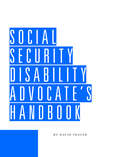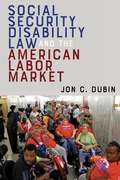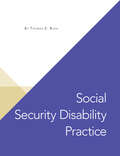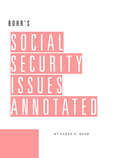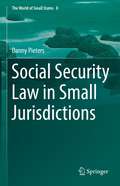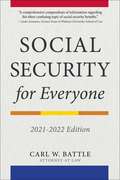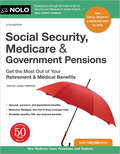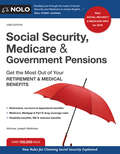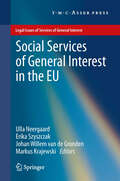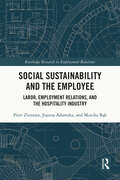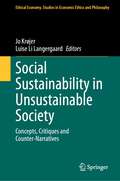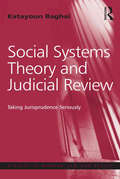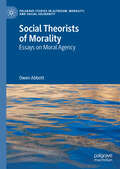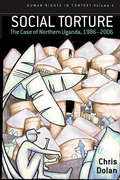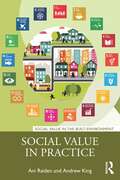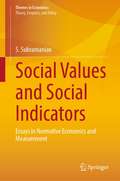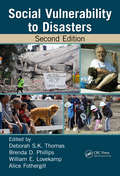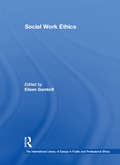- Table View
- List View
Social Security Disability Advocate’s Handbook
by David TraverSocial Security Disability Advocate's Handbook is a sophisticated guide filled with pattern questions and supporting data that will help you (1) knowledgeably and effectively challenge vocational testimony, and (2) use the Process Unification Rulings as powerful weapons for your claimants. David Traver's sophisticated guide also serves as a valuable source for when you need to educate the ALJ about the limits placed by Social Security Rulings. Social Security Disability Advocate's Handbook shows you how to turn the Rulings into powerful weapons for your claimants: * Remind ALJs what the Rulings require with 93 "commands" to agency adjudicators excerpted from the Rulings. * Rebut common but invalid reasons ALJs use to reject claimant's allegations. * Prevent the ALJ from rejecting a medical source statement based on the ALJ's finding that the medical source was not aware of all the medical and other evidence in the file. * And more!
Social Security Disability Law and the American Labor Market
by Jon C. DubinHow social security disability law is out of touch with the contemporary American labor market Passing down nearly a million decisions each year, more judges handle disability cases for the Social Security Administration than federal civil and criminal cases combined. In Social Security Disability Law and the American Labor Market, Jon C. Dubin challenges the contemporary policies for determining disability benefits and work assessment. He posits the fundamental questions: where are the jobs for persons with significant medical and vocational challenges? And how does the administration misfire in its standards and processes for answering that question? Deploying his profound understanding of the Social Security Administration and Disability law and policy, he demystifies the system, showing us its complex inner mechanisms and flaws, its history and evolution, and how changes in the labor market have rendered some agency processes obsolete. Dubin lays out how those who advocate eviscerating program coverage and needed life support benefits in the guise of modernizing these procedures would reduce the capacity for the Social Security Administration to function properly and serve its intended beneficiaries, and argues that the disability system should instead be “mended, not ended.”Dubin argues that while it may seem counterintuitive, the transformation from an industrial economy to a twenty-first-century service economy in the information age, with increased automation, and resulting diminished demand for arduous physical labor, has not meaningfully reduced the relevance of, or need for, the disability benefits programs. Indeed, they have created new and different obstacles to work adjustments based on the need for other skills and capacities in the new economy—especially for the significant portion of persons with cognitive, psychiatric, neuro-psychological, or other mental impairments. Therefore, while the disability program is in dire need of empirically supported updating and measures to remedy identified deficiencies, obsolescence, inconsistencies in application, and racial, economic and other inequities, the program’s framework is sufficiently broad and enduring to remain relevant and faithful to the Act’s congressional beneficent purposes and aspirations.
Social Security Disability Medical Tests
by David Morton IIIEvaluate Social Security Medical Disability Test Results Effective advocacy requires informed and critical evaluation of your clients' medical tests and their results. Were they properly performed? By the right person? Interpreted correctly? What is the chance of a false negative result? Here you will find normal test ranges, predictive values, relevant listings, proper technique, and more for 470 medical tests. You will be able to critically examine the application of test results to disability claims. Here is the authoritative and detailed guidance from a former SSA Chief Medical Consultant who has personally made more than 50,000 disability determinations. Dr. David Morton's Social Security Disability Medical Tests answers the following questions for nearly every test you will encounter: * When is the test warranted? * Can SSA purchase it? Does it commonly do so? * What are the relevant social security medical listings? * What complications can result? * How should the test be performed? * Is the test objective, providing independently verifiable information based upon observation? Or is it subjective, depending upon the information elicited by the testing physician? * What is the probability that the test will not detect the abnormality? * What is the prevalence of the abnormality in the population? * What is the normal range of test results? The book is written in plain English and details more than 500 medical tests frequently encountered in SSA disability determinations. Real-life examples and explanatory drawings accompany many texts. Medical terms are explained as they occur in the text. Over 700 medical abbreviations are defined. Also provided are more than 80 normal laboratory test values and eight different treadmill stress test protocols.
Social Security Disability Practice
by Thomas BushDetailed guidance is important when navigating the hidden rules, obscure interpretations, and frequent delays common to Social Security disability cases. Turn to Tom Bush's Social Security Disability Practice when challenges or questions arise. This 1000-page masterwork covers the waterfront of social security disability practice: Selecting good cases. Sections 160-62 Determining the basis for denial, and common erroneous reasons for denial. Sections 173, 207 Comparison of Social Security disability and SSI. Section 135 Obtaining and dealing with medical and vocational opinion evidence. Section 220 Impairment-specific RFC questionnaires. Section 230 Issues commonly arising in hearings. Section 287 Preparing claimants and witnesses to testify, including questionnaires and letters. Section 290 Specific and detailed hearing questions for claimants, witnesses, and experts. Chapter 3 Proving inability to do unskilled sedentary work, including cross-examination questions. Section 346.6 Using the Medical-Vocational Guidelines as framework for decision-making, with charts, questions for the vocational expert, and court decisions. Section 348 Res judicata and reopening applications. Section 370 Index of key rulings. Appendix 1 Calculating back benefits, with worksheet. Section 430 Payment issues and solutions, with directory of contact information. Section 440 Developing a legal theory for appeal, with checklist and sample briefs. Chapter 5 Attorney fee issues and solutions. Chapter 7 And much, much more. Considered by many to be the most practical work in the field, Social Security Disability Practice is chock-full of practice-proven forms. Developed by author Tom Bush for his own office, these forms will save you hours and improve your advocacy. Just a few of the tips found in the helpful charts, appendices and forms. Minimize the frustrations in dealing with the SSA, the author, a veteran disability representative, clarifies issues such as: developing the theory of the case, establishing and proving pain, dealing with vocational and medical experts and using the fee agreement process. Useful forms, questionnaires, and checklists help you streamline cases. The two volume book now includes access to Jamesforms.com, containing more than 120 forms and the full-text of the book.
Social Security Issues Annotated
by Sarah Bohr Kimberly Cheiken Curtis FisherBohr's Social Security Issues Annotated With Bohr's Social Security Issues Annotated, author Sarah Bohr has assembled the arguments and cases she uses to construct winning briefs for social security disability practitioners around the nation. This valuable drafting tool, which is supported by over 3,600 citations, contains: * A checklist of errors commonly occurring in the sequential evaluation process, assessment of disability, evaluating specific impairments, and administrative review. * A summary of cases decided in the last eight years, organized by circuit. * This section includes a valuable table of cases organized by issue. * An exhaustive outline of the law, organized first by issue and then by circuit, and drafted in argument format. * Detailed dissection of 48 common issues. This section contains summaries of the applicable statutes, regulations, rulings, POMS, cases, and practice pointers. Now you can efficiently produce the same persuasive and well-supported arguments that Ms. Bohr has used to win cases for disability lawyers around the country.
Social Security Law in Small Jurisdictions (The World of Small States #8)
by Danny PietersThe book examines whether small jurisdictions (states) are confronted with specific issues providing social security and how to deal with these issues. How is social security law impacted by the smallness of the jurisdiction? First, the author examines the key concepts ‘small jurisdiction’ and ‘social security’ as he understands them in the present research. He then pays some attention to the relation between social security and social security law and subsequently makes an excursion to explore the notion of legal transplants. In the second part, the author first examines the main features characterizing small states according to the general literature on small states, focusing on features which may be relevant to social security. He also includes an overview of the (limited) literature dealing with the specific social security issues small jurisdictions have to deal with. In other words, the second part provides the reader with the status quaestionis. In the third part, the author takes a look at the social security systems of 20 selected small jurisdictions. He does so according to a uniform scheme, in order to facilitate their comparison. These 20 case studies allow him in a next part to test the correctness of the statements made in Part 2. In the fourth part, he compares the social security systems of the 20 small jurisdictions. He draws conclusions as to the main question, but also to test the validity of the current literature on the topic as described in Part 2. Special attention goes to the use of legal transplants for the definition of the personal scope of social security arrangements. In the concluding part of the book, the author formulates some suggestions for the benefit of the social security systems of the small jurisdictions, based on his research.
Social Security for Everyone: 2021-2022 Edition
by Carl W. BattleAll the essential information everyone should know about social security, from maximizing benefits to planning and budgeting for a healthy, happy retirement. Nearly 70 million American citizens—1 in 5 people in the US—receive social security benefits each month, and that number is increasing rapidly. With so many people drawing from the system, it's critical for anyone about to start receiving benefits to be well-informed and prepared, and for anyone already receiving social security to make sure they're aware of how to maximize their benefits and to plan ahead for the future. In Social Security for Everyone, lawyer and bestselling author Carl W. Battle's clear, matter-of-fact explanations will prepare any reader to deal with and understand every aspect of social security benefits. Important topics covered include:How to apply for social securityWhy many people never receive social security benefitsHow to maintain independence while receiving social security benefitsBreakdowns of social security benefits for families, survivors, and the disabledTaxes and social security and how they interactHow to manage and deal with the Social Security AdministrationSocial Security for Everyone also includes dozens of crucial charts, graphs, and tables to help readers plan for retirement, budget for different situations, and maximize their benefits. It's essential reading for anyone preparing to use social security benefits and everyone who is already receiving social security, as well as anyone who wants to know more about this invaluable system.
Social Security, Medicare & Government Pensions
by Joseph MatthewsYour complete guide to Social Security retirement and medical benefits The rules for claiming Social Security have changed. Find out if you still qualify to "file and suspend" benefits or to choose between your own benefits and spousal benefits before these strategies disappear. Learn this and more with Social Security, Medicare & Government Pensions--completely updated for 2016. Social Security benefits. Figure out how to get retirement, disability, dependents and survivors benefits, or Supplemental Security Income (SSI). Decide whether it's best to claim benefits early, at full retirement age, or not until you turn 70--and how to time your claims so you and your spouse get the best benefits. Medicare & Medicaid. Learn how to qualify for and enroll in both programs, including Medicare Part D drug coverage. Medigap insurance & Medicare Advantage plans. Understand what new Medigap policies are available (and old ones that aren't), compare Medigap and Medicare Advantage plans, and choose what's best for you. Government pensions & veterans benefits. Discover when and how to claim the benefits you have earned. Whether you're looking for yourself or helping a parent, you'll find valuable information here, including how to file many essential forms online.
Social Security, Medicare & Government Pensions: Get the Most Out of Your Retirement and Medical Benefits
by Joseph MatthewsIf you want to get the highest possible retirement or pension income – not to mention the best medical coverage – turn to Social Security, Medicare & Government Pensions to discover the benefits you're entitled to and how to claim them as easily as possible. Navigate the complex and often daunting Social Security and Medicare systems using the resources and information in this complete guide. Learn about Medicare coverage, including Part D prescription drug coverage, and understand Medicare Advantage and medigap insurance plans are and what makes the most sense for you. And if you are denied for any medical treatment or benefits, this book teaches you how to file an appeal with Medicare, Social Security, or your state’s Medicaid agency. Also learn how to claim disability benefits, veterans benefits, and federal retirement benefits. This new edition updates the benefit numbers for Social Security, Medicare, SSI, and veterans benefits for 2022.
Social Security, Medicare and Government Pensions
by Joseph MatthewsMaximize your Social Security, SSI, and Medicare benefits and navigate the system with confidence. Everyone wants to get the highest possible retirement and pension income - not to mention the best medical coverage. Turn to Social Security, Medicare & Government Pensions to discover the benefits you're entitled to and how to claim them as easily as possible. Navigate the complex and often daunting Social Security and Medicare systems using the resources and information in this complete guide. Learn how to: -determine the amount of benefits you're entitled to -qualify and apply for Medicare and Medicaid, including Part D prescription drug coverage -understand medigap and managed care -claim earned government pensions and Veterans' benefits -time your retirement to get the best results This edition includes new information on Medicare rules and how federal healthcare reform legislation may affect your coverage, updated benefit numbers for Social Security, Medicare, and SSI, and fully up-to-date resources and contact information.
Social Security, Medicare and Government Pensions
by Joseph Matthews AttorneyIf you want to get the highest possible retirement or pension income - not to mention the best medical coverage, turn to Social Security, Medicare & Government Pensions to discover the benefits you're entitled to and how to claim them as easily as possible. Navigate the complex and often daunting Social Security and Medicare systems using the resources and information in this complete guide. Learn about Medicare coverage, including Part D prescription drug coverage, and understand medigap insurance and Medicare managed care and what makes the most sense for you. And if you are denied for any medical treatment or benefits, this book teaches you how to file an appeal with Medicare, Social Security, or your state's Medicaid agency. Also learn how to claim disability benefits, veterans benefits, and federal retirement benefits. This edition updates benefit numbers for Social Security, Medicare, and SSI for 2015.
Social Security, Medicare and Government Pensions: Get the Most Out of Your RETIREMENT & MEDICAL BENEFITS
by Joseph MatthewsYour complete guide to Social Security retirement and medical benefits. If you want to get the highest possible retirement or pension income – not to mention the best medical coverage – turn to Social Security, Medicare & Government Pensions to discover the benefits you're entitled to and how to claim them as easily as possible. Navigate the complex and often daunting Social Security and Medicare systems using the resources and information in this complete guide. Learn about Medicare coverage, including Part D prescription drug coverage, and understand what Medicare Advantage and medigap insurance plans are and what makes the most sense for you. And if you are denied any medical treatment or benefits, this book teaches you how to file an appeal with Medicare, Social Security, or your state’s Medicaid agency. Also learn how to claim disability benefits, veterans benefits, and federal retirement benefits. This edition updates benefit numbers for Social Security, Medicare, and SSI for 2020.
Social Security, Medicare and Government Pensions: Get the Most Out of Your Retirement and Medical Benefits
by Joseph Matthews<p>Your complete guide to Social Security retirement and medical benefits. <p>The rules for claiming Social Security have changed. Find out if you still qualify to file and suspend benefits or to choose between your own benefits and spousal benefits before these strategies disappear. Learn this and more with <i>Social Security, Medicare & Government Pensions</i>--completely updated for 2018. <p> <li>Social Security benefits. Figure out how to get retirement, disability, dependents and survivors benefits, or Supplemental Security Income (SSI). Decide whether it's best to claim benefits early, at full retirement age, or not until you turn 70--and how to time your claims so you and your spouse get the best benefits. <li>Medicare & Medicaid. Learn how to qualify for and enroll in both programs, including Medicare Part D drug coverage. <li>Medigap insurance & Medicare Advantage plans. Understand what new Medigap policies are available (and old ones that aren't), compare Medigap and Medicare Advantage plans, and choose what's best for you. <li>Government pensions & veterans benefits. Discover when and how to claim the benefits you have earned. Whether you're looking for yourself or helping a parent, you'll find valuable information here, including how to file many essential forms online.</li> </p>
Social Security, Medicare and Government Pensions: Get the Most Out of Your Retirement and Medical Benefits
by Joseph MatthewsYour complete guide to Social Security retirement and medical benefits. The rules for claiming Social Security benefits are changing. Find out if you can still choose between your own benefits and spousal benefits. Learn this and more with Social Security, Medicare & Government Pensions--completely updated for 2018. Social Security benefits. Social Security benefits. Figure out how to get retirement, disability, dependents and survivors benefits, or Supplemental Security Income (SSI). Decide whether it’s best to claim benefits early, at full retirement age, or not until you turn 70—and how to time your claims so you and your spouse get the best benefits. Medicare & Medicaid. Learn how to qualify for and enroll in both programs, including Medicare Part D drug coverage. Medigap insurance & Medicare Advantage plans. Compare Medigap and Medicare Advantage plans, and choose what’s best for you. Government pensions & veterans benefits. Discover when and how to claim the benefits you have earned. What’s New in 2018? New Medicare cards coming to you in 2018 How unpaid student loan debt can reduce your benefits New ABLE savings accounts for people with disabilities, and New Medicare costs and Social Security amounts for 2018. Whether you’re looking for yourself or helping a parent, you’ll find valuable information here to help get the benefits you’ve earned.
Social Security, Medicare and Government Pensions: Get the Most Out of Your Retirement and Medical Benefits
by Joseph Matthews AttorneyYour complete guide to Social Security retirement and medical benefits. If you want to get the highest possible retirement or pension income – not to mention the best medical coverage, turn to Social Security, Medicare & Government Pensions to discover the benefits you're entitled to and how to claim them as easily as possible. Navigate the complex and often daunting Social Security and Medicare systems using the resources and information in this complete guide. Learn about Medicare coverage, including Part D prescription drug coverage, and understand medigap insurance and Medicare managed care and what makes the most sense for you. And if you are denied for any medical treatment or benefits, this book teaches you how to file an appeal with Medicare, Social Security, or your state’s Medicaid agency. Also learn how to claim disability benefits, veterans benefits, and federal retirement benefits. This edition updates benefit numbers for Social Security, Medicare, and SSI for 2017.
Social Services of General Interest in the EU
by Erika Szyszczak Markus Krajewski Johan Willem Gronden Ulla NeergaardThe EU has limited legislative competence in the field of social law. However, the Member States are increasingly modernizing social services and social (welfare) protection, attempting to make social services more efficient by increasingly looking to the market for the provision of such services. This policy move brings social services into the radar of EU law. The EU response to this sensitive issue has resulted in a piecemeal and fragmented approach towards the treatment of a new policy area of Social Services of General Interest (SSGI) in EU law and policy. This book is a first contribution towards charting how SSGI have emerged as a special category of SGI in the EU, the reaction of the Member States and stake-holders and how policy is being made through new governance processes, carve-outs and safe havens in legislation and soft law, especially in the light of the new values of the EU introduced by the Treaty of Lisbon 2009. It takes an inter-disciplinary approach and will be of interest to lawyers, economists and political scientists who are interested in EU policy-making as well as practioners, EU and national policy-makers. Ulla Neergaard is Professor of EU law at the Faculty of Law, University of Copenhagen, Denmark. Erika Szyszczak is a Jean Monnet Professor of European Law ad personam, Professor of European Competition and Labour Law at the University of Leicester, Barrister, Littleton Chambers, UK. Johan W. van de Gronden is Professor of European Law at the Radboud University of Nijmegen, The Netherlands. Markus Krajewski is Professor of Public and International law at the University of Erlangen-Nuremberg.
Social Sustainability and the Employee: Labor, Employment Relations, and the Hospitality Industry (Routledge Research in Employment Relations)
by Piotr Zientara Joanna Adamska Monika BąkThis research monograph delves into the pressing issue of employee-centered social sustainability in the hospitality industry. Through empirical studies and content analysis of CSR reports, it highlights the significant challenges faced by frontline hospitality workers – such as low wages, job insecurity, limited union representation, and employer resistance to unionization.Offering a thorough, evidence-based examination, the monograph provides a comprehensive analysis of the employee dimension of social sustainability. It explores the critical role of organizational support, the fear of unionizing, and their impact on key outcomes like employee well-being and industry turnover intentions. The work also proposes a tailored framework for addressing employee needs at different stages of their careers, advancing the goal of "decent work" within the industry.Ideal for scholars and researchers in workforce studies, hospitality, and tourism, this volume offers valuable insights into the complex dynamics of labor practices and social sustainability. It serves as a vital resource for those seeking to foster employee-centered CSR initiatives. Policymakers, industry professionals, and advocates for improved labor conditions in hospitality will also find this book informative and thought-provoking, with actionable strategies for promoting social responsibility across the sector.
Social Sustainability in Unsustainable Society: Concepts, Critiques and Counter-Narratives (Ethical Economy #67)
by Luise Li Langergaard Jo KrøjerThis book offers a unique, critical exploration of concepts and practices of social sustainability through both a critical concept analysis as well as empirical studies of practices that undermine social sustainability. It addresses the questions: What is the main role of social relations and social practice in the transition from fundamentally unsustainable societies and local practices towards a sustainable future? And how does economical sustainability reduce or enhance social sustainability? The chapters in this work define and understand social sustainability in relation to principles such as solidarity, community, welfare, reciprocity, and regenerative co-existence. These principles are analyzed through the lens of emotions, respect, carefulness, sensitivity, and art, to establish counter-principles and narratives to principles like growth, efficiency, capitalism, and mastery of nature. Such counter-narratives to mainstream understandings and histories of economy aid in shedding light on a variety of different aspects of sustainability. The book presents a methodological plurality including conceptual and empirical approaches, praxis-oriented and inductive approaches. The chapters present interdisciplinary approaches concerning welfare, ecology, sociology, organization and economy, social psychology and aesthetics and therefore appeal to a broad audience of scholars and academics.
Social Systems Theory and Judicial Review: Taking Jurisprudence Seriously (Studies in Modern Law and Policy)
by Katayoun BaghaiThis book demonstrates the empirical gains and integrative potentials of social systems theory for the sociology of law. Against a backdrop of classical and contemporary sociological debates about law and society, it observes judicial review as an instrument for the self-steering of a functionally differentiated legal system. This allows close investigation of the US Supreme Court’s jurisprudence of rights, both in legal terms and in relation to structural transformations of modern society. The result is a thought-provoking account of conceptual and doctrinal developments concerning racial discrimination, race-based affirmative action, freedom of religion, and prohibition of its establishment, detailing the Court’s response to boundary tensions between functionally differentiated social systems. Preliminary examination of the European Court of Human Rights’ privacy jurisprudence suggests the pertinence of the analytic framework to other rights and jurisdictions. This contribution is particularly timely in the context of increasing appeals to fundamental rights around the world and the growing role of national and international high courts in determining their concrete meanings.
Social Theorists of Morality: Essays on Moral Agency (Palgrave Studies in Altruism, Morality, and Social Solidarity)
by Owen AbbottThis book provides an interdisciplinary series of essays on key social theorists of morality. It explores contributions to social moral theorising made by W. E. B. Du Bois, G. H. Mead, Jane Addams, Alasdair MacIntyre, Carol Gilligan, Seyla Benhabib, Kwame Anthony Appiah, and Jonathan Haidt. It thus seeks to integrate alternative voices at the “foundations” of sociological theorising about morality, while entering into dialogues with post-Enlightenment moral philosophy and contemporary moral psychology. In so doing, it engages with perspectives of pragmatism, virtue ethics, care ethics, feminist critiques, and moral foundations theory. The essays discuss key topics in social theories of morality, including moral action, socialisation, habit and reflexiveness, relationships, emotion, self, identity, racism and colonialism, universalism, and innateness. It centres crucial (but often overlooked) questions of moral power, and assesses the relationship between moral theorising and normative argument. The essays are conjoined by a running theme of moral agency—how it is constituted and how it is enacted—which orientates the book’s arguments and critiques.
Social Torture
by Chris DolanAs Director of the Refugee Law Project at the University of Makerere, Kampala, Uganda, Dolan offers a behind-the-scenes, cross-disciplinary study of one of Africa's longest running and most intractable conflicts. This book shows how, alongside the activities of the Lord's Resistance Army, government decisions and actions on the ground, consolidated by humanitarian interventions and silences, played a central role in creating a massive yet only very belatedly recognized humanitarian crisis. Not only individuals, but society as a whole, came to exhibit symptoms typical of torture, and the perpetrator-victim dichotomy became blurred. It is such phenomena, and the complex of social, political, economic and cultural dynamics which underpin them, which the author describes as social torture. Building on political economy, social anthropology, discourse analysis, international relations and psychoanalytic approaches to violence, this book offers an important analytical instrument for all those seeking entry points through which to address entrenched conflicts, whether from a conflict resolution, post-conflict recovery or transitional justice perspective.
Social Value in Practice (Social Value in the Built Environment)
by Andrew King Ani RaidenSocial Value in Practice offers the reader a simple, accessible guide for considering, creating, and delivering social value in projects and within their organisation. The book connects social value to the global Sustainable Development Goals (SDGs) and presents an insight into the many and different practical ways in which individuals and organisations can make a positive impact towards resolving the ‘people, planet and prosperity’ agenda: 'Good work' – good practice in managing people, including working conditions, and equality, diversity, and inclusion Education, skills, and employment, including apprenticeships and enhancing the industry image Social procurement and circular supply chains Strategic partnerships and social enterprises Community development, regeneration, and placemaking Construction consultancy Architecture, design, and construction Assessing and measuring social value. Reflective practitioners can pick it up, turn to a chapter, and learn something they can use right away. Through numerous practical examples and think pieces, this book can help readers learn how to create social value, how to improve and build upon current practice, and how to co-create social value in partnership with clients and the supply chain. The authors aim to empower and inspire stakeholders to engage with new ideas and create more value for those using the built environment. This book is a must read for all those involved in procuring, tendering, planning, designing, developing, funding, building, working in, and managing the built environment.
Social Values and Social Indicators: Essays in Normative Economics and Measurement (Themes in Economics)
by S. SubramanianThe book is a collection of essays written since 2010, and dealing, in one way or another, with the place of values in economic analysis. The centrality of values in the collection is not surprising, given that the thematic concerns informing the essays in the book relate principally to methodological issues in economic enquiry, to the normatively constrained aggregation of personal preferences into collective choice, and to problems of logical coherence and ethical appeal in the axiom systems underlying the measurement of economic and social phenomena such as poverty, inequality and literacy. While many of the essays are more or less technical in nature, they are all explicitly motivated by considerations that go beyond the formalisms of presentation to an involvement with the role of moral reasoning in economic analysis. In particular, the essays emphasize the importance of ‘ought propositions’ in a science which is all too often regarded as being wholly and exclusively ‘positive’ in its orientation. The book should be of particular interest to researchers, students, and public policy makers.
Social Vulnerability to Disasters
by Alice Fothergill Brenda D. Phillips Deborah S.K. Thomas William E. LovekampThe 2010 Haiti and Chili earthquakes, the 2010 BP oil spill in the Gulf of Mexico, and the 2011 Fukushima earthquake and tsunami in Japan are but a few examples of recent catastrophic events that continue to reveal how social structure and roles produce extensive human suffering and differential impacts on individuals and communities. These events
Social Work Ethics (The International Library of Essays in Public and Professional Ethics)
by Eileen GambrillThis collection of essays highlights ethical issues in social work which are often overlooked as well as recurring clashes that influence how they play out, for example among different values and related moral judgements. A wide range of ethical issues are addressed such as the types of technologies incorporated into social work; issues raised by the common position of social workers as 'double agents' required to carry out state mandates while also honoring obligations to clients; and issues concerning the distribution of scarce resources. These topics are integrally related to other often neglected concerns such as harming in the name of helping; the ethics of claims making regarding what is true and what is not, and related concerns regarding empowerment and social justice. This collection, which includes essays from an array of professions and disciplines, is designed to bring these neglected topics to the attention of readers and to offer suggestions for addressing them in a manner that is faithful to obligations described in social work codes of ethics.
